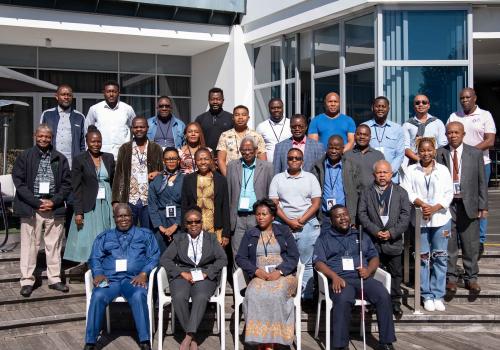The Southern African Development Community (SADC) conducted a workshop aimed at enhancing the capacity of Electoral Management Bodies (EMBs) and Non–State Actors (NSAs) on strategies to prevent electoral-related conflicts on 24th April 2023, in Johannesburg, South Africa. The workshop was part of SADC’s Support to Peace and Security (SPSS) Programme in the Region, which is implemented with financial support from the European Union.
During the workshop, participants received information on the causes of conflicts and what contributed to conflict escalation; how to identify and apply different dispute resolution methods in real-life scenarios, and how to strengthen the roles that EMBs and NSAs can play in preventing and managing possible Election-related disputes. The workshop also served as a platform for stakeholders and SADC to discuss causes of violence and made recommendations on ways to address electoral disputes during all the phases of the electoral cycle.
Speaking during the workshop, Mr. Fabrice Kitenge Tunda, Mediation and Peacebuilding Officer in the Directorate of the Organ on Politics, Defence and Security Affairs highlighted that SADC is committed to a peaceful and stable Region as it strives to promote full participation of its citizens in the electoral processes, good governance and the conduct of democratic elections.
Mr. Tunda added that SADC’s commitment to a peaceful and stable region was also evidenced by the development and adoption of the Strategy for the Prevention of Electoral–related conflict which supports the introduction of dialogue and national mediation efforts at all phases of the electoral cycle, with multiple stakeholders and at multiple levels. The aim of the strategy is to identify and diffuse tensions before they escalate or become violent, and to contribute to the peaceful resolution of Electoral-related disputes within Member States.
The SPSS Programme has also embarked on an elaborate exercise aimed at strengthening national Dispute Resolution Mechanisms with strategic involvement of NSAs and EMBs.
Mr. Tunda underscored how sustainable development, enhanced regional integration and stability cannot be achieved unless peace and security issues are addressed in a sustained and mutually reinforcing manner. Closer collaboration between the SADC Secretariat, the NSAs and EMBs has prevented the spectre of violence, conflicts, and instability in most SADC Member States. Evidence of SADC enhancing its collaboration with the NSAs is showcased through the development of a regional mechanism for engagement, especially in the areas of peace and security.
This year, 2023, four (4) SADC Member States, namely the Democratic Republic of Congo (DRC), the Kingdom of Eswatini, and the Republics of Madagascar and Zimbabwe will hold general elections. In this regard, Mr. Tunda asserted that SADC would continue to strengthen the regional and national mechanisms and structures to prevent and address the underlying root causes of conflict and instability without resorting to violence and hoped that the workshops would make critical recommendations on the efforts being deployed by all stakeholders to prevent elections–related conflict.
Participants were drawn from the databases of national NSAs, namely the academia, religious organisations, community leaders, civil society organisations and Non-Governmental Organisations, the youth and women groups, in collaboration with the SADC Council of Non–Governmental Organisations and EMBs.

